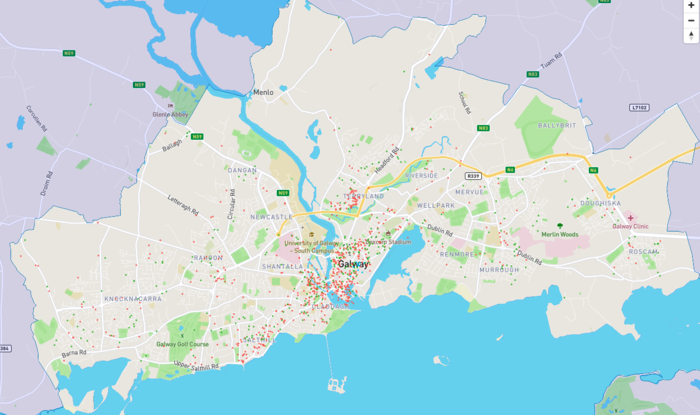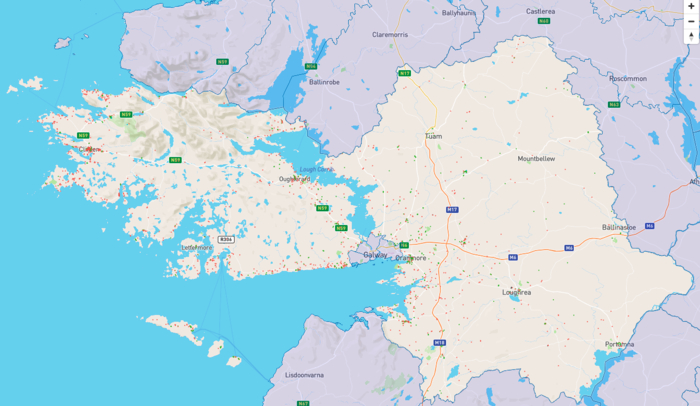The Galway Advertiser can reveal that just 25 out of 636 of entire homes available on Airbnb for short term rent in Galway city have been registered and approved by the local authority, despite laws targeting such practices.
Despite Galway city's status as a Rent Pressure Zone (RPZ ), the lack of enforcement of legislation by the local authority, coupled with a very poor rate of compliance by the owners of short-term lettings in the city, has resulted in a lose-lose situation for the city's renters. Since 2019, property owners who wish rent an entire home in which they do not reside, on a short term basis, are required to seek planning permission through the local authority.
Despite this, since 2023, Galway City Council has received just 25 registration applications of short-term lets; 18 from 2023 and seven applications to date in 2024. This combined figure accounts for just 3.9 per cent of the total number of entire homes available for rent currently on Airbnb.
Using figures from Inside Airbnb, an organisation which compiles Airbnb's own listings data into an interactive map, multi-listings by single hosts is significantly high in Galway city, with 73.3 per cent of the listings advertised by an individual who has more than one property, or type of accommodation advertised.

The map of AirBnb listings currently available for short-term let online in Galway city. Marked in red are listings that are an entire property. Image taken from Inside AirBnb's website.
Shockingly, according to Inside Airbnb, three property owners account for 110 entire homes listed for short term lets in Galway city alone, with just one individual host profile advertising 46 entire properties within the area of the city, followed by hosts with 35 and 29 homes listed respectively.
Under legislation, which was designed to stop short-term lets from exacerbating the worst housing crisis in Irish history, those found to be illegally renting an entire home that is not their primary residence in a RPZ are subject to legal action.
Despite this, Galway City Council has investigated just one case of illegal short-term letting since 2023, and there have been no instances of full enforcement carried out during this time.
Short-term letting criteria
Defined as the 'letting of a house or apartment, or part of a house or apartment, for any period not exceeding 14 days', short-term letting rules largely apply to those renting out entire homes that are not their principal private residence. Galway City Council requires those who offer short term lets for a period exceeding more than 14 days for a non-primary principal residence, or more than 90 days for those who rent out their home while living there, to apply for a change of use planning permission.
Short-term lettings register
This law is expected to be further solidified later this year, when Fáilte Ireland's Short Term Tourist Letting (STTL ) Register is expected to be introduced. When launched, all proprietors who offer short term letting for up to, and including, 21 nights will have to register online, regardless of the type of accommodation offered.
Tied to the Short Term Tourist Letting Bill, once the bill is signed into law, Fáilte Ireland's register will go live resulting in the first comprehensive report of short term letting in Ireland. Currently, Fáilte Ireland estimates that some 20,000 entire homes in Ireland are being advertised online for short-term letting despite laws being introduced to reduce this figure.

The rate of short-term lets in Galway soars as the stock of long-term housing available continues to plummet. Photo: iStock.
Highlighting the issue
According to housing advocacy and advice charity, Threshold, reported that from December 2023 until March 2024, there were 1,217 entire properties listed on AirBnb in Galway city and county. Currently, there are 1,937 entire properties available on Airbnb, versus 113 properties advertised for long-term rent on Daft.ie In addition to the disproportionate stock of housing being advertised for short-term letting versus long-term letting, Threshold also highlighted the multiple listings of homes for rent by one host.
"One host (eight years hosting ) has 25 homes ranging from traditional townhouses to penthouse apartments – most of which are in Galway city. A two-night weekend stay in a two-bed costs €441.
"Meanwhile, the only other equivalent property that is available on Daft.ie that is under €2000 per month is €467 a week. As with other examples listed here, this host can earn, in less than two weeks, the equivalent income in the private rental market. Regulation is needed so families in Galway can access much-needed housing stock."
All eyes on County Galway
Short-term letting laws currently only apply to areas designated as Rent Pressure Zones (RPZ ). Despite the lack of evidence of these measures and protections being utilised locally, Galway city and county are now both designated as RPZ, thus awarded the same legal protections. This comes following the addition of the whole of Galway County Council's administrative area to the RPZ register on September 12, 2024. The electoral areas of Athenry - Oranmore and Gort - Kinvara were previously designated as RPZ in July, 2019.
Just one month since Galway was, in its entirety, designated as an RPZ there are 1,301 entire homes available for short-term lets in across County Galway. Add to this the 636 homes in the city, the result is a combined figure of 1,937 entire homes available for short term lets at a time when Galway needs them most.

The map of AirBnb listings currently available for short-term let online in Galway county. Marked in red are listings that are an entire property. Image taken from Inside AirBnb's website.
With no defined plan in place to tackle this issue from either of Galway's local authorities, desperate hope has been directed at Fáilte Ireland's long awaited Short Term Tourist Letting Register to tackle the growing issue of illegal short term letting in Galway city and county.
With AirBnB announcing just yesterday (Wednesday ) that Salthill and Galway city are 'trending winter destinations 2024' for domestic travellers, it is likely that unless proactive measures are put in place, the supply will continue to match demand.

